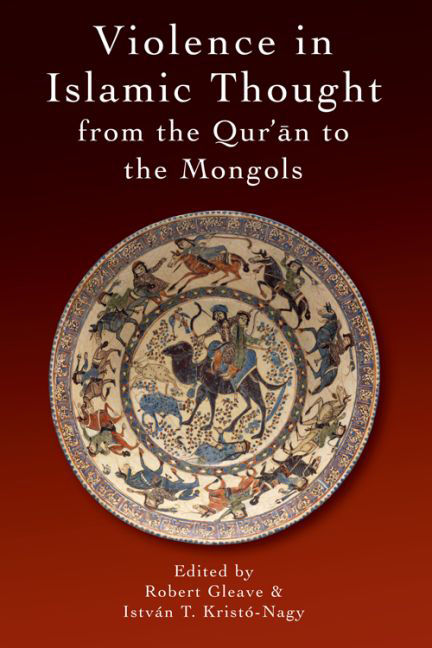Book contents
- Frontmatter
- Contents
- Dates and Abbreviations
- List of Figures and Tables
- 1 INTRODUCTION
- PART I JIHĀD AND CONQUEST: ATTITUDES TO VIOLENCE AGAINST THE EXTERNAL ENEMIES OF THE MUSLIM COMMUNITY
- PART II THE CHALLENGED ESTABLISHMENT: ATTITUDES TO VIOLENCE AGAINST THE STATE AND IN ITS DEFENCE WITHIN THE MUSLIM COMMUNITY
- PART III LUST AND FLESH: ATTITUDES TO VIOLENCE AGAINST THE DEFENCELESS, INTRA-COMMUNITARIAN VIOLENCE BY NON-STATE ACTORS
- 10 VIOLENCE AGAINST WOMEN IN ANDALUSI HISTORICAL SOURCES (THIRD/NINTH–SEVENTH/THIRTEENTH CENTURIES)
- 11 SEXUAL VIOLENCE IN VERSE: THE CASE OF JITHIN, AL-FARAZDAQ'S SISTER
- 12 BANDITS
- 13 EATING PEOPLE IS WRONG: SOME EYEWITNESS ACCOUNTS OF CANNIBALISM IN ARABIC SOURCES
- 14 ANIMALS WOULD FOLLOW SHĀFIISM: LEGITIMATE AND ILLEGITIMATE VIOLENCE TO ANIMALS IN MEDIEVAL ISLAMIC THOUGHT
- Bibliography
- Index of Qurānic Citations
- General Index
11 - SEXUAL VIOLENCE IN VERSE: THE CASE OF JITHIN, AL-FARAZDAQ'S SISTER
from PART III - LUST AND FLESH: ATTITUDES TO VIOLENCE AGAINST THE DEFENCELESS, INTRA-COMMUNITARIAN VIOLENCE BY NON-STATE ACTORS
Published online by Cambridge University Press: 15 September 2017
- Frontmatter
- Contents
- Dates and Abbreviations
- List of Figures and Tables
- 1 INTRODUCTION
- PART I JIHĀD AND CONQUEST: ATTITUDES TO VIOLENCE AGAINST THE EXTERNAL ENEMIES OF THE MUSLIM COMMUNITY
- PART II THE CHALLENGED ESTABLISHMENT: ATTITUDES TO VIOLENCE AGAINST THE STATE AND IN ITS DEFENCE WITHIN THE MUSLIM COMMUNITY
- PART III LUST AND FLESH: ATTITUDES TO VIOLENCE AGAINST THE DEFENCELESS, INTRA-COMMUNITARIAN VIOLENCE BY NON-STATE ACTORS
- 10 VIOLENCE AGAINST WOMEN IN ANDALUSI HISTORICAL SOURCES (THIRD/NINTH–SEVENTH/THIRTEENTH CENTURIES)
- 11 SEXUAL VIOLENCE IN VERSE: THE CASE OF JITHIN, AL-FARAZDAQ'S SISTER
- 12 BANDITS
- 13 EATING PEOPLE IS WRONG: SOME EYEWITNESS ACCOUNTS OF CANNIBALISM IN ARABIC SOURCES
- 14 ANIMALS WOULD FOLLOW SHĀFIISM: LEGITIMATE AND ILLEGITIMATE VIOLENCE TO ANIMALS IN MEDIEVAL ISLAMIC THOUGHT
- Bibliography
- Index of Qurānic Citations
- General Index
Summary
At some time towards the end of the first/seventh century, a relatively trivial incident took place. An Arab of the tribe of Tamīm called Hammām b. Ghālib visited a clan not his own, the Banū Minqar, also belonging to Tamīm. A woman, waking up her daughter called Ẓamyā, found that a snake had crept into her clothes. She cried for help and Hammām, who happened to be nearby, chased the snake away by throwing some dust at it. The snake had probably been attracted by the warmth of the girl's body; Hammām was attracted to it in turn: he touched the girl and kissed her, but she resisted and he left, making a mocking epigram on her and her clan. When her relatives heard this, they were angry and one of them called Amr (or Imrān) b. Murra, who was sent to play a trick upon Hammām's sister, Jithin. Amr lay in wait for her and approached her unawares when, at night, she left her tent ‘to do her business’. He put his hands on her hip and her leg and dragged her along for some distance. She cried out and when her tribesmen hastened to the scene Amr fled. In another version, there were, in fact, three other men, who together with Amr/Imrān dragged Jithin from her tent.
That was all; no more physical recriminations took place, nobody was raped or killed. We would not have known about the affair if this Hammām, Jithin's brother, had not been a famous poet better known as al-Farazdaq, one of the great poets of the Umayyad period, and if he had not been involved in a protracted poetic battle, a ‘flyting’ or scolding match exchanging verbal abuse, with another giant of Arabic literary history, the poet Jarīr b. Aṭiyya. Jarīr, universally lauded as a poet excelling in delicate love lyrics, heard about the matter and exploited it repeatedly in many of his lampooning poems, called naqāiḍ, grossly blowing up the incident by graphically depicting a gang rape in obscene detail, while accusing the victim's brother of being scandalously remiss in rescuing her.
- Type
- Chapter
- Information
- Violence in Islamic Thought from the Qur'an to the Mongols , pp. 175 - 190Publisher: Edinburgh University PressPrint publication year: 2015



